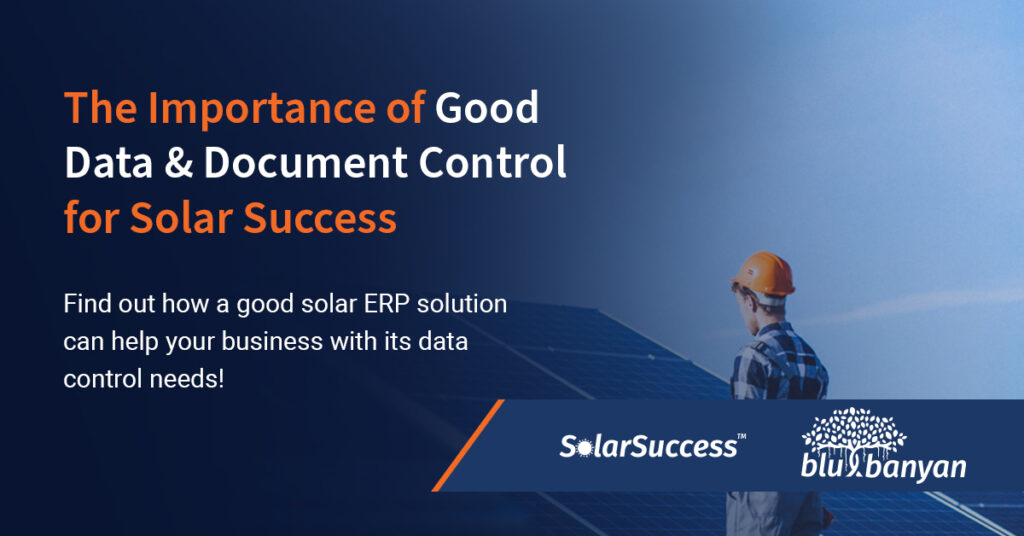In the solar energy industry, where successful installations and efficient operations are key to achieving solar success, having good data and document control is paramount. Effective data management and document control practices help harmonize information, ensure accuracy, and provide a single source of information for all staff within the organization.
Document Management, Harmonizing Data, and Its Importance to Solar Installers
Solar installation projects involve a significant amount of paperwork, including permits, contracts, designs, and invoices. Solar installers also need to handle vast amounts of data related to leads, projects, customer information, project management, inventory management, and financial transactions. Properly managing all these documents and harmonizing this data is crucial for efficient operations and decision-making. Data harmonization refers to the process of bringing together your data of varying file formats, naming conventions, and columns, and transforming it into one cohesive data set. This process turns all of your disparate data into the same format you need for analysis.
By harmonizing data and organizing documents, information is standardized, organized, and easily accessible. This way, solar installers can eliminate inconsistencies, reduce errors, and enhance overall operational efficiency.
The Costly Impact of Data Silos and Document Dungeons
Data silos and document dungeons, where data and documents are scattered across multiple systems, can be detrimental to solar installers. This means that the data is not available to the entire organization, but only to some parts of it, such as departments, teams, or even individual employees. These fragmented data environments lead to inefficiencies, delays, and increased costs. Data silos make obtaining a holistic view of your operations difficult, impeding effective decision-making and hindering growth. Implementing a robust solar ERP software solution like SolarSuccess helps break down these silos and eliminates the document dungeons, ensuring that data and documents are centralized and easily accessible to authorized personnel.
Your Decisions Are Only as Good as Your Data
It is essential to recognize that the quality of your decisions relies heavily on the quality of your data. Inaccurate or incomplete data can lead to poor decision-making, missed opportunities, and increased risks. By establishing robust data control processes and leveraging SolarSuccess, solar installers can have confidence in their data, enabling them to make informed decisions based on accurate and reliable information.
Analyzing and Cleaning Your Data Before Reporting or Integrating Applications
Before reporting or integrating applications, it is crucial to analyze and clean your data to ensure accuracy and consistency. This involves identifying and resolving data inconsistencies, addressing missing or incorrect information, and performing data validation checks. By taking these steps, you can ensure that your reports and integrated applications are based on reliable data, leading to better insights and enhanced operational efficiency.
Good Reporting Leads to Accurate Forecasting
Accurate forecasting is vital for solar installers to plan and optimize their installations effectively. Good reporting enables solar installers to generate comprehensive reports that provide insights into project performance, resource utilization, revenue forecasting, and more. This accurate forecasting helps optimize resource allocation, manage project timelines, and make data-driven decisions for future growth.
SolarSuccess and Your Single Source of Truth
To achieve solar success, solar installers need a single source of truth—a centralized repository of accurate and up-to-date data. The only way to overcome conflicting data from incompatible applications, is to move to a platform that has a single data source underlying all business operations, from accounting and inventory, to project management and CRM.
This is where ERP software can come in handy; it can digitize document management, centralize document storage, enable collaboration, and streamline approval processes, reducing manual paperwork and improving document accessibility and accuracy. ERP software also plays a key role in harmonizing data. Using a data-driven approach, the software can generate real-time reports and provide data analytics on various aspects of the business, such as project costs, resource utilization, sales performance, and profitability.
SolarSuccess a leading solar ERP software solution built on Oracle NetSuite, is vital in providing this single source of truth. NetSuite’s powerful business management suite can be enhanced by Blu Banyan’s advanced project management and team collaboration applications. By integrating and consolidating data from various sources, SolarSuccess creates a unified view of the entire business operations. This enables solar installers to make informed decisions, optimize resource allocation, and streamline processes effectively.
In conclusion, good data and document control are integral to solar success. By implementing effective data control practices, solar installers can optimize their operations, make informed decisions, and position themselves for success in the competitive solar energy industry. SolarSuccess by Blu Banyan offers solar installers a comprehensive solution for harmonizing data, ensuring a single source of truth, and leveraging data for growth.
To learn more about SolarSuccess, the first and only complete software solution designed for the solar industry, reach out today!



